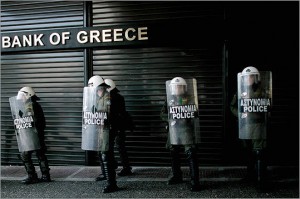Greekonomics
 During our vacation in July, I reported a piece for The Boston Globe Ideas section about the economic crisis in Greece, which was just published today. Two questions intrigued me. How much would the collapse of the economy degrade actual quality of life? And had the Greeks proved that market orthodoxy was partly based on a mirage by calling its bluff and surviving?
During our vacation in July, I reported a piece for The Boston Globe Ideas section about the economic crisis in Greece, which was just published today. Two questions intrigued me. How much would the collapse of the economy degrade actual quality of life? And had the Greeks proved that market orthodoxy was partly based on a mirage by calling its bluff and surviving?
The answer, I found, was that average working Greeks were suffering substantial losses, and were bracing for far more in the fall — for starters 5 to 10 percent cuts in real wages and real pensions for many people, in addition to increased taxes. That’s not taking into account rising unemployment, social tension, and macroeconomic changes.
For Greece, the real test comes in the next few months, when the government tries to move ahead with the austerity plan it promised Europe in exchange for the bailout, and Greek unions take to the streets.
What happens next will resonate far beyond this small country’s borders. Greece is about to learn whether a modern state can withdraw entitlements that people have come to take for granted but which the government no longer can afford. For fiscal hawks, this is a harbinger of what could happen to the American economy when, say, the social security system finally goes bankrupt, or when the government no longer has enough money to fund Medicare. For Greeks, it’s something else as well — a kind of identity crisis for a way of life defined almost as a rebuke to contemporary liberal market economics.
Americans, the saying goes, live to work; Greeks work to live. As a credo, it reflects a Greek belief that a worker on any rung of the class ladder deserves security and pleasure in exchange for hard work. It’s not outsized salaries or short workdays that define the Greek model. First and foremost it’s job security: Until recently Greeks struggled to find jobs, but once employed they never feared losing them. A close second is the principle of egalitarian access to the pleasures of life: going out to eat or listen to music on the weekends, and taking your family on Easter and summer vacations.
From the outside, the Greek sense of entitlement is often misunderstood as a desire for some kind of lazy lifestyle. In actuality, though, most of the government and union workers raising hell in the streets work hours as long as any American blue collar or office worker; many of them, in fact, work two jobs — at a bank or ministry in the morning, driving a taxi in the evening. What Greeks have treasured for decades and are now contemplating losing is the kind of job security that most Americans surrendered in the 1970s. All those wasteful government jobs underwrote a vast reservoir of public confidence, and in large measure blessed Greece with a joie de vivre. Small entrepreneurs don’t feel as stressed when the government countersigns their loans and when they know, if the business fails, they still have a stable job at the state water and sewer authority.


[…] economic crisis in Greece has taken a huge toll on the country, and heightened generational anxiety. At the same time, economic opportunities are dampened everywhere right now, not just in […]